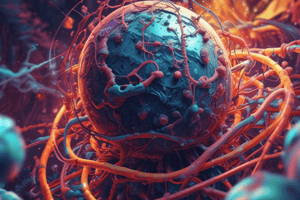Podcast
Questions and Answers
What is a variable?
What is a variable?
Any factors that change during an experiment
What are the two types of variables?
What are the two types of variables?
Independent and dependent
What is an independent variable?
What is an independent variable?
The variable that is changed by the person doing the experiment
What is a dependent variable?
What is a dependent variable?
It is only possible to have one what variable?
It is only possible to have one what variable?
What is another definition for an independent variable?
What is another definition for an independent variable?
Is the independent variable a cause or an effect?
Is the independent variable a cause or an effect?
Is it possible to have more than one dependent variable?
Is it possible to have more than one dependent variable?
What does the dependent variable show?
What does the dependent variable show?
Where is the dependent variable usually placed on a graph?
Where is the dependent variable usually placed on a graph?
What is a constant?
What is a constant?
Why must these factors remain the same?
Why must these factors remain the same?
Why are constants called constants?
Why are constants called constants?
What is a control?
What is a control?
Qualitative data doesn't use what?
Qualitative data doesn't use what?
What is the scientific method in order?
What is the scientific method in order?
What does 'look for same' refer to?
What does 'look for same' refer to?
The factor that is changed is known as the?
The factor that is changed is known as the?
Graphs are used for what?
Graphs are used for what?
What can graphs be used for?
What can graphs be used for?
Interpolate and extrapolate are examples of certain what?
Interpolate and extrapolate are examples of certain what?
What does 'inter' mean?
What does 'inter' mean?
What does 'extra' mean?
What does 'extra' mean?
Flashcards are hidden until you start studying
Study Notes
Variables and Their Types
- Variables are factors that can change during an experiment.
- Two main types of variables exist: independent and dependent.
- The independent variable is altered by the experimenter and is considered the "cause" in the cause and effect relationship.
- The dependent variable is observed in response to changes in the independent variable and typically represents the "effect."
Characteristics of Independent and Dependent Variables
- Only one independent variable is permitted in an experiment for clarity.
- Multiple dependent variables can be observed simultaneously.
- The dependent variable demonstrates the impact of the independent variable's modifications.
- On a graph, the dependent variable is usually represented on the y-axis, while time is always placed on the x-axis.
Constants and Controls in Experiments
- Constants are factors that remain unchanged throughout all experimental groups to ensure valid results.
- Keeping constants stable is crucial to avoid skewing the experiment's outcomes.
- Constants earn their name due to their unchanging nature during the course of the experiment.
- Control measurements provide a baseline to compare experimental results against.
Data Types and Graphing
- Qualitative data refers to non-numeric observations and descriptions.
- Graphs play a significant role in analyzing data, identifying trends, and establishing relationships.
- Graphs can be utilized to interpolate (predict within the data range) and extrapolate (predict beyond the data range).
Scientific Method Overview
- The scientific method consists of several key steps:
- Make an observation
- Identify the problem
- Conduct research on the issue
- Formulate a hypothesis
- Perform an experiment
- Analyze the data collected
Terminology Related to Graphs
- "Interpolate" means to estimate values within the existing range of data.
- "Extrapolate" refers to extending findings beyond the observed data range.
- Both interpolation and extrapolation are techniques used in graph analysis.
Studying That Suits You
Use AI to generate personalized quizzes and flashcards to suit your learning preferences.




